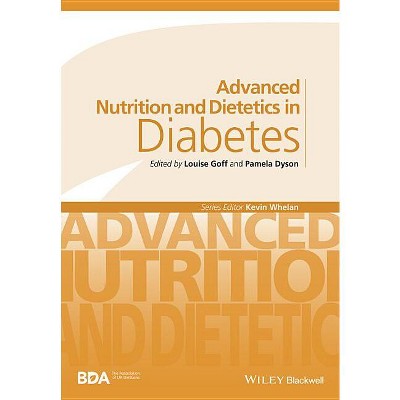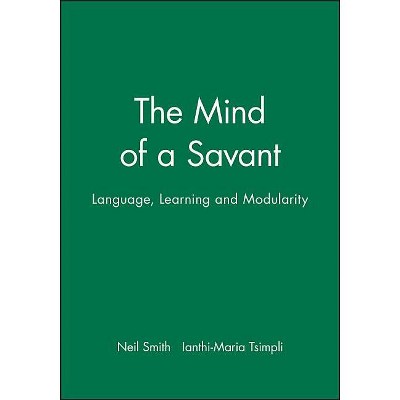Essential Endocrinology and Diabetes - (Essentials) 7th Edition by Richard I G Holt & Neil A Hanley (Paperback)

About this item
Highlights
- Essential Endocrinology and Diabetes vermittelt den aktuellen Wissenstand zu allen Behandlungsbereichen der Endokrinologie und Diabetes: klinische Leitlinien, Untersuchungsmethoden und Therapien.
- About the Author: Richard I.G. Holt, Professor in Diabetes and Endocrinology, Human Development and Health, Faculty of Medicine, University of Southampton, Southampton, UK.
- 336 Pages
- Medical, Endocrinology & Metabolism
- Series Name: Essentials
Description
About the Book
"The textbook aims to be valued by different groups of reader. Its core purpose is still to provide a foundation from understanding the science to clinical training in undergraduate medicine. In addition, the content here should also be invaluable for postgraduate clinicians training in the specialty of endocrinology and diabetes. Written 'exit' examinations have become increasingly common during the later stages of clinical specialty training and we hope our textbook provides complementary study material alongside larger reference textbooks and published clinical guidelines. From feedback, we realise that our book has been valued by biomedical undergraduate and masters students and by those pursuing clinical biochemistry. We hope the new content increases this reach across different audiences. Learning objectives, recap points, cross-referencing guides, boxes, and concluding key points help orientate the reader and emphasize the major topics. Based on the success of previous editions, the book is still structured in much the same way. The first part is designed to create a knowledgeable reader, well prepared for the clinical sections or for more specific scientific study. To assist the many students coming from non-scientific backgrounds we limit assumptions on prior knowledge. Chapter 1 still covers the core principle of feedback regulation which underlies nearly all endocrine physiology and is vital for the correct interpretation of many clinical tests. Chapter 3 has advanced to encompass the latest research made possible from next generation sequencing technology. The latter has already started to impact significantly on clinical investigation and diagnostics in endocrinology and diabetes. This is covered in Chapter 4, which also includes positron emission tomography (PET) imaging. It is important that aspiring clinicians, as well as scientists, appreciate these new approaches, their application and their challenges. The second part of the book still follows its organ or system-based approach. We have retained the more specific scientific knowledge at the start of these chapters to underpin understanding, diagnosing and managing the relevant clinical disorders. The third part on diabetes and obesity has seen the greatest change from the previous edition. Over the last 8 years, there have been significant advances in the treatment of both type 2 diabetes, such as the new incretin-based therapies and SGLT2 inhibitors, and type 1 diabetes with the development of better insulins and the use of technology to support self-management. Clinical algorithms have also changed and these have been updated"--Book Synopsis
Essential Endocrinology and Diabetes vermittelt den aktuellen Wissenstand zu allen Behandlungsbereichen der Endokrinologie und Diabetes: klinische Leitlinien, Untersuchungsmethoden und Therapien. Dieses Standardlehrwerk erläutert prägnant und leicht verständlich die wesentlichen physiologischen Aspekte des endokrinen Systems und bietet darüber hinaus Illustrationen und klinische Aufnahmen in Farbe sowie Fallstudien, anhand derer der Transfer in die Praxis gelingt. Diese Publikation beschäftigt sich mit den Prinzipien der Endokrinologie, klinischen Endokrinologie, klinischen Diabetes und Adipositas. Die 7. Auflage wurde vollständig überarbeitet und spiegelt die jüngsten Entwicklungen des Fachgebiets wider. Hinzu kommen neue und aktualisierte Inhalte zu den jüngsten molekularen Verfahren, Ansätzen der klinischen Untersuchung und Diagnostik, Next-Generation-Technologien zur Sequenzierung sowie zur Positronen-Emissions-Tomographie (PET). Die Behandlungsverfahren von Diabetes Typ 1 und Typ 2 wurden um klinische Algorithmen ergänzt und beleuchten wegweisende Fortschritte, u. a. inkretinbasierte Therapien, SGLT-2-Inhibitoren, die Entwicklungen bessere Insuline und Verfahren zur Unterstützung des Selbstmanagements.- Stellt Studenten und Ärzten umfassend die relevanten Informationen zu allen wichtigen physiologischen Aspekten des endokrinen Systems zur Verfügung.
- Beschäftigt sich mit Diagnose, Management und Komplikationen klinischer Erkrankungen wie endokrine Neoplasie, Typ-1- und Typ-2-Diabetes.
- Erklärt die Kernprinzipien der Feedback-Regulation als wichtiges Instrument für die korrekte Interpretation einer Vielzahl klinischer Tests.
- Bietet Fallbeispiele, Lernziele, Verweise auf Zusammenfassungen der Kapitelinhalte, Querverweise, Textkästchen mit wichtigen Informationen und Kapitelzusammenfassungen. Die 7.Auflage von Essential Endocrinology and Diabetes ist das ideale Lehrbuch für Studenten der Medizin und Biomedizin, Assistenzärzte und Kliniker, die ihre Kenntnisse des Fachgebiets auffrischen möchten.
From the Back Cover
ESSENTIAL ENDOCRINOLOGY AND DIABETES
The Essentials are an international, best-selling series of textbooks, all of which are designed to support lecture series or themes on core topics within the health sciences. See www.wiley.com for further details.
Essential Endocrinology and Diabetes provides the accurate and up-to-date knowledge required for treating all areas of endocrinology and diabetes, covering the latest research, clinical guidelines, investigational methods, and therapies. This classic text explains the vital aspects of endocrine physiology in a succinct and easy-to-use format, with full-colour illustrations, clinical images, and case studies to assist readers in applying theory to practice.
The text covers the principles of endocrinology, clinical endocrinology, and clinical diabetes and obesity, and has been revised throughout to present the most recent developments in the field. The seventh edition includes new and updated material on the latest molecular techniques, approaches to clinical investigation and diagnostics, next generation sequencing technology, and positron emission tomography (PET). The treatment of type 1 diabetes and type 2 diabetes has been updated with clinical algorithms and reflects significant advances such as incretin-based therapies, SGLT2 inhibitors, the development of better insulins, and technologies that support self-management.
- Provides students and practitioners with comprehensive and authoritative information on all major aspects of endocrine physiology
- Covers diagnosis, management, and complications of clinical disorders such as endocrine neoplasia, and type 1 diabetes and type 2 diabetes
- Explains the core principle of feedback regulation, which is vital for the correct interpretation of many clinical tests
- Features case histories, learning objectives, 'recap' links to chapter content, cross-referencing guides, key information boxes, and chapter summaries
Essential Endocrinology and Diabetes, Seventh Edition is the ideal textbook for medical and biomedical students, junior doctors, and clinicians looking to refresh their knowledge of endocrine science.
For more information on the complete range of Wiley medical student and junior doctor publishing, please visit: www.wiley.com
To receive automatic updates on Wiley books and journals, join our email list. Sign up today at www.wiley.com/email
All content reviewed by students for students
Wiley Medical Education books are designed exactly for their intended audience. All of our books are developed in collaboration with students. This means that our books are always published with you, the student, in mind.
If you would like to be one of our student reviewers, go to www.reviewmedicalbooks.com to find out more.
This title is also available as an e-book. For more details, please see www.wiley.com/buy/9781118763964
About the Author
Richard I.G. Holt, Professor in Diabetes and Endocrinology, Human Development and Health, Faculty of Medicine, University of Southampton, Southampton, UK.
Neil A. Hanley, Professor of Medicine, Faculty of Biology, Medicine and Health, University of Manchester, Manchester, UK.
Shipping details
Return details
Trending Diet, Health & Fitness Books











